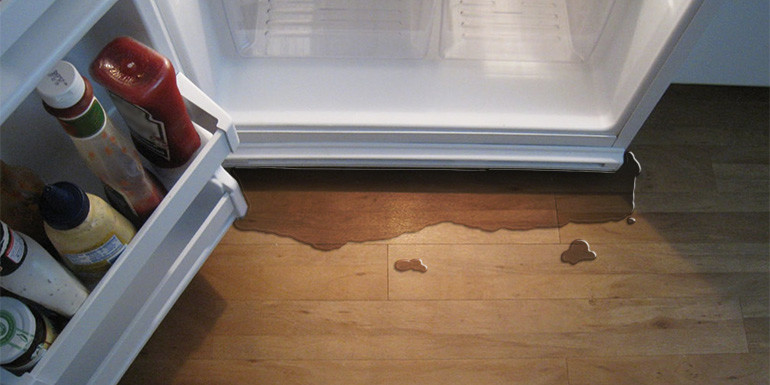2 Reasons Your Fridge Might be Leaking – And How to Fix It

If you’ve ever journeyed to your kitchen in the middle of the night for a nightcap or a snack and realized your feet were wet, you’ve been the owner of a faulty fridge. While you may pray that it’s the result of a simple spill on the part of your roommate or child, it’s important to troubleshoot the problem.
In addition to possibly causing an electric shock, a slip, or even damage to one’s floor, water leaks can be a sign of a serious refrigerator malfunction. To avoid running the risk of encountering any of these problems, the issue should be addressed immediately. Indeed, leaks are quite common amongst most fridge models, if they are left unattended for long periods of time, without maintenance.
However, this doesn’t mean tearing apart your fridge and trying to immediately alleviate the problem. It’s important to understand what might be wrong with it, even if you do decide to seek out cooler repair services in Toronto or its surrounding areas.
Even if you’re not looking for appliance repair services in Toronto to make your appliances woes go away in a pinch, these experts can clearly identify the problem. Without their experienced eyes, you’ll only have a few rules of thumb to go off of. For instance, water leaks in fridges typically boil down to a few patterns.
If you have an inside water leak, the problematic area is the interior defroster drain line. Because of a malfunction, it’s unable to release condensation, hence the pooling of liquid in your fridge’s cabinets. Today’s freezers run on a cycle of freezing and defrosting which means it is constantly producing condensation. The excess moisture travels down the defrost drain and is caught by the drain pan under the fridge.
The small drain can easily become blocked with food particles, ice chunks, or it can freeze shut. As water builds up from the defrost cycle, it can leak out of the refrigerator and onto the floor. Most drain lines are positioned behind the crisper drawers. If you can easily remove the top of the drain outlet, inspect it for clogs. Often flushing the drain with warm water will clear the line. If not, contact a professional to investigate further.
For a rear water leak, the problem is likely with the ice maker or water line. In some cases, only a repair technician can tell you whether or not it’s the fridge or your home’s water supply that is giving you trouble. For front water leaks, you’ll need to look to the drain tube, which is likely clogged. Finally, a bottom centre simply indicates an issue with the drain pan. While you may not be able to fix these issues, being able to identify them will save you some stress and a bit of the repair technician’s time on the clock.
No matter the problem, the first thing to do during a leak situation – before or after a technician arrives – is to unplug your fridge and pull it away from the wall, as soon as possible. This will inhibit any risk of electric shock.
Furthermore, there’s also the possibility of door seal failure. Surprisingly, a puddle under your refrigerator may not be caused by a leak but excess condensation from a door not sealing properly. If the rubber door seals are compromised, your refrigerator will run constantly. This will lead to condensation build-up on the coils and eventually, water on the floor.
If you suspect that the liquid on your floor is something other than water, specifically if it’s possibly refrigerant, it’s important that you contact a technician right off the bat. During the refrigeration process, this mixture transforms incessantly, becoming both a liquid and gas many times; it can cause significant health risks and should be addressed ASAP; no matter the source of the leak, you should contact us to learn more today.